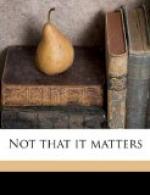How to Write for the Press disappointed me. It is concerned not with the literary journalist (as I believe he is called) but with the reporter (as he is never called, the proper title being “special representative"). It gives in tabular form a list of the facts you should ascertain at the different functions you attend; with this book in your pocket there would be no excuse if you neglected to find out at a wedding the names of the bride and bridegroom. It also gives—and I think this is very friendly of it—a list of useful synonyms for the principal subjects, animate and inanimate, of description. The danger of calling the protagonists at the court of Hymen (this one is not from the book; I thought of it myself just now)—the danger of calling them “the happy pair” more than once in a column is that your readers begin to suspect that you are a person of extremely limited mind, and when once they get this idea into their heads they are not in a proper state to appreciate the rest of your article. But if in your second paragraph you speak of “the joyful couple,” and in your third of “the ecstatic brace,” you give an impression of careless mystery of the language which can never be shed away.
Among the many interesting chapters is one dealing with contested elections. One of the questions to which the special representative was advised to find an answer was this: “What outside bodies are taking active part in the contest?” In the bad old days—now happily gone for ever—the outside bodies of dead cats used to take an active and important part in the contest, and as the same body would often be used twice the reporter in search of statistics was placed in a position of great responsibility. Nowadays, I suppose, he is only meant to concern himself with such bodies as the Coal Consumers’ League and the Tariff Reform League, and there would be no doubt in the mind of anybody as to whether they were there or not.
I am afraid I should not be a success as “our special representative.” I should never think of half the things which occur to the good reporter. You read in your local paper a sentence like this: “The bride’s brother, who only arrived last week from Australia, where he held an important post under the Government, and is about to proceed on a tour through Canada with—curiously enough—a nephew of the bride-groom, gave her away.” Well, what a mass of information has to be gleaned before that sentence can be written. Or this. “The hall was packed to suffocation, and beneath the glare of the electric light— specially installed for this occasion by Messrs. Ampre & Son of Pumpton, the building being at ordinary times strikingly deficient in the matter of artificial lighting in spite of the efforts of the more progressive members of the town council—the faces of not a few of the fairer sex could be observed.” You know, I am afraid I should have forgotten all that. I should simply have obtained a copy of the principal speech, and prefaced it with the words,” Mr. Dodberry then spoke as follows”; or, if my conscience would not allow of such a palpable misstatement, “Mr. Dodberry then rose with the intention of speaking as follows.”




